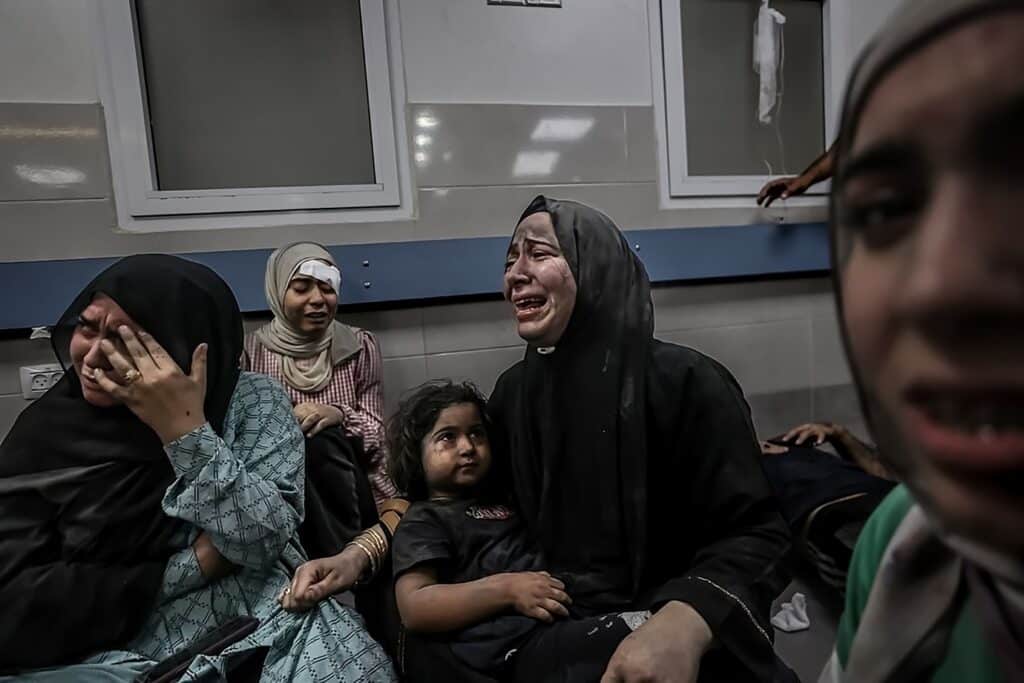As the international community responds to the humanitarian crisis in Gaza, it’s clear that women and girls are paying a high price. UN Women has released data showing gendered impacts of the conflict cannot be overlooked.
Close to 493,000 women and girls have been displaced from their homes in Gaza.
Around 668,000 women and girls are in need of protection from gender-based violence, as identified by the 2023 Humanitarian Needs Overview (HNO). This number will have risen.
And a surge of widows has emerged from the violence as 1,487 men have been killed. This has produced close to 900 new households headed by women and 3,103 children who’ve lost their fathers.
To keep these horrific numbers from increasing further, UN Women is continuing to call for an immediate humanitarian ceasefire, the immediate release of hostages and unrestricted and sustained humanitarian access– including food, water, fuel and health supplies for women and girls in the Gaza Strip.
Following the 7 October 2023 attack by Hamas on Israel– resulting in an estimated 1,400 deaths, 4,629 injuries and an estimated 200 people taken hostage– the Israeli Armed Forces launched strikes against Gaza– resulting in more than 3,785 Palestinian deaths and more than 12,500 people injured.
Even prior to the present crisis, 98 per cent of women and 97 per cent of men living in Gaza were fearing for their safety.
Along with the effects of conflict, the needs and vulnerabilities of these women are unique due to structural gender discrimination. Laws in Palestine assume women to be under the guardianship of men, which increases women’s risk of gender-based violence and food and housing insecurity.
Women’s health risks
Currently, women and girls are seeking refuge in overcrowded shelters that lack essential provisions like food, water and privacy.
Infant and maternal mortality is a grave concern as the UNFPA estimates that there are 540,000 women of reproductive age in Gaza, among whom 50,000 are pregnant and 5,522 are expected to deliver in the next month.
Having spent years chronicling the medical crisis in Palestine, Dr Yara M. Asi, an assistant professor at the University of Central Florida’s School of Global Health Management told The Cut: “We’re going to see a significant increase in infant and maternal mortality, not just from airstrikes, but from inability to feed an infant and to deliver in safe, hygienic circumstances.”
“During the last few months of pregnancy, you need not just medical care, but nutritional food, access to clean water, some feeling of mental safety. If the deprivation continues, pregnant women are going to start dying of malnutrition and lack of water.”
These women are also at elevated risks of sexual and labour exploitation, human trafficking and forced marriage. Elderly women, particularly those with disabilities, will face the highest level of negligence and violence, according to UN Women estimates.
Urgent action is critical
Following Gaza’s blackout– Israel severed internet, wi-fi and phone connections– Executive Director of UN Women Sima Bahous reported that UN Women has lost contact with their team located in the strip.
On X (formerly Twitter), Bahous shared that she’s “gravely concerned for them & their families”.
Adding to the call for humanitarian action, and in support of a ceasefire, Sarah Hendriks, UN Women Deputy Executive Director, ad interim has said it’s “imperative that we ensure immediate access to services for women and girls and ensure the prevention of gender-based violence”.
“As the international community seeks to respond to this crisis, we must also wholeheartedly support and invest in women-led organisations, which are at the front-line of the humanitarian response, and promote the meaningful participation of women in humanitarian and political processes.”


